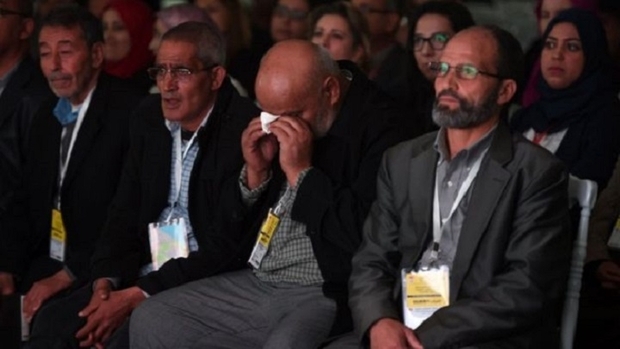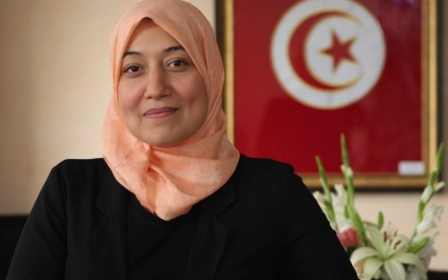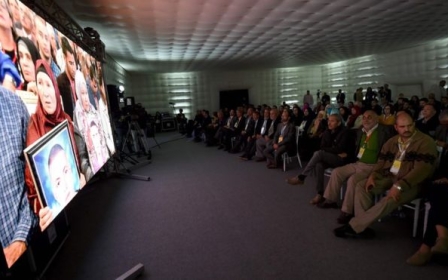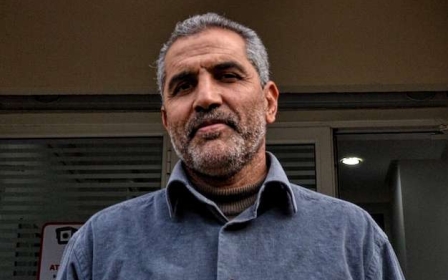The voices of Tunisia's repressed echo across a region still under tyranny

After long months of political and legal wrangling, Tunisia’s Truth and Dignity Commission has finally managed to establish itself as one of the most important transitional justice institutions in the country born out of its 2014 constitution.
Earlier this month, the commission held the first round of public hearings of the victims of state oppression since the country’s independence in 1956. They started with the “Youssefist” trend of Salah Ben Youssef, secretary-general of the New Doustrouri Party, whose followers suffered persecution and torture at the hands of Tunisia's new rulers under independence leader Habib Bourguiba.
These live testimonies with the gruesome details they narrated have been profoundly shocking to Tunisians and outside observers
A glimpse of this early wave of repression was given by the octogenarian national independence fighter Hamadi Ghars, who narrated painful details of the assassinations, kidnappings and imprisonment of the Youssefists. They rejected the internal independence document that gave the French jurisdiction over the the country’s security forces, instead insisting on continuing the common struggle for the full liberation of Tunisia and neighbouring Algeria from French colonial rule.
The brutality unleashed against the old comrades in arms is still known in Tunisian history (written by Ben Yussef’s rival and arch-enemy, Bourguiba, who emerged victorious out of the schism and served as the country’s first president) as "the eradication of the Youssefist sedition”.
Colonial legacy
The testimony of Gilbert Naccache, the prominent left-wing intellectual who had been arrested and tortured in the 1960s, exposed the gruesome details of the second wave of oppression waged this time against left-wing activists and trade unionists.
Naccache stressed the similarity of patterns of persecution in pre and post-independence Tunisia, as the new ruling elite inherited the same methods and mechanisms of persecution used by the French during their occupation of the country. From being deployed by the colonisers to subjugate the native populations, they were now used by their successors against political dissidents.
The new ruling elite inherited the same methods and mechanisms of persecution used by the French during their occupation of the country
But by far the most brutal era and harshest on the souls and bodies of political opponents has been that of General Zine El-Abidine Ben Ali, who overthrew the senile Bourguiba in November 1987 and ruled the country with an iron fist for 23 years. During his rule, arrests and torture assumed a systematic nature, used not only to persecute political opponents, but to terrorise the whole population and impose discipline.
“The jailor placed a cloth on an iron rod, dipped it in a very toxic fluid and shoved it into my brother’s anus as he was suspended from the ceiling, his hands and feet tied together in a position notoriously known as "roast chicken", his skin peeled off from three days of beating and suspension," Jamel Baraket, the brother of Faisal Barakat who died from torture in 1991, testified.
"Then the jailor brought the iron rod out amidst my brother’s cries. The cells were burnt, the blood vessels exploded and he started to bleed heavily from his rectum...This the jailor did repeatedly amidst the laughter of his colleagues, and in full view of other detainees...”
A machine of repression
These live testimonies with the gruesome details they narrated have been profoundly shocking to Tunisians and outside observers.
They exposed the other hidden face of pre-revolution Tunisia, long concealed behind carefully constructed facades, of the golden sandy beaches, manicured lawns and fancy resorts of glossy tourist brochures, and the fake jargon of modernity and human rights long exploited by the regime and its apologists.
The truth that became more apparent with every testimony was that the pre-revolution Tunisian state was no more than a machine of force used to terrorise society into silence
As one victim after another narrated their experiences in the terrifying torture chambers of Tunisia’s gulags, where prisoners were stripped naked, raped, starved, and tortured for days, often to death, it became evident that their tragedies were not products of individual violations by this or that official or prison guard, but part of the core structure of the state itself.
The truth that became more apparent with every testimony was that the pre-2011 Tunisian state was no more than a machine of force used to break dissidents mentally and physically and terrorise society into silence and submission.
The Truth and Dignity Commission has provided the framework for the principle of transitional justice established in the new Tunisian constitution. It gave a voice to the thousands of victims and their families, suppressed for decades by consecutive regimes. They bitterly recounted their painful stories of persecution and repression.
But the tears shed were not only theirs, but also those of the millions in Tunisia and abroad who witnessed the public hearings broadcast live on Tunisian national TV.
Freeing the victim and the jailor
Through these testimonies, the stories of oppression assumed their rightful place within collective memory, no longer mere accounts of individual trauma and suffering. The voice of the victim as she delves in the depths of the past, exposing crimes and horrors perpetrated behind high walls, in the dark dungeons of dictatorship, becomes more potent than the jailor’s whip and torture weapons.
The tears shed were not only theirs, but also those of the millions in Tunisia and abroad who witnessed the public hearings broadcast live on Tunisian national TV
The aim of transitional justice is not to avenge the victims, but to liberate both victim and jailor, through exposure of the horrors meted on the one and confession of the crimes committed by the other. The purpose is to finally heal long-festering wounds and mend old cracks, in the hope of drawing a line of closure under the dark chapters of totalitarianism in Tunisia’s modern history.
Indeed, the revolution should free both victim and jailor, the victim whose body was subjected to all forms of abuse and violation, and the jailor who was used as the instrument of subjugation and terror by a system founded on repression.
Generation after generation of Tunisian activists and dissidents have suffered the horrors of torture, imprisonment and forced exile. Many have gone to their graves without seeing their dream of a homeland free of injustice, persecution, arbitrary arrests and violation of human dignity realised.
Today, their voices, the sighs of those crushed by decades of state repression, Youssefists, nationalists, trade unionists, leftists and Islamists, echo in the victims' public testimonies.
Perhaps this could offer a glimpse of hope to an Arab world still reeling under the crushing weight of despotism, that its long struggles for freedom and dignity have not been in vain, and that sooner or later justice will prevail.
- Soumaya Ghannoushi is a British Tunisian writer and expert in Middle East politics. Follow her on twitter: @SMGhannoushi
The views expressed in this article belong to the author and do not necessarily reflect the editorial policy of Middle East Eye.
Photo: Relatives of abuse victims watch a live broadcast of the testimonials before The Truth and Dignity Commission in Tunisia on 17 November (AFP).
This article is available in French on Middle East Eye French edition.
New MEE newsletter: Jerusalem Dispatch
Sign up to get the latest insights and analysis on Israel-Palestine, alongside Turkey Unpacked and other MEE newsletters
Middle East Eye delivers independent and unrivalled coverage and analysis of the Middle East, North Africa and beyond. To learn more about republishing this content and the associated fees, please fill out this form. More about MEE can be found here.





